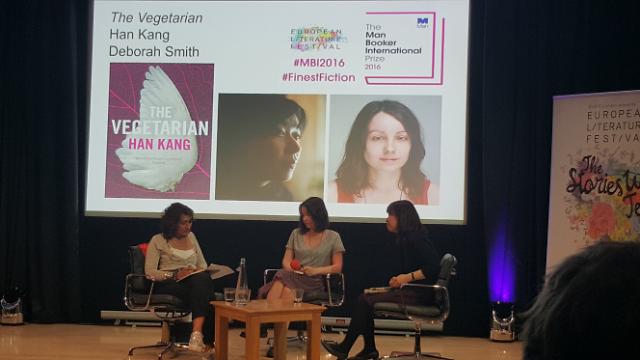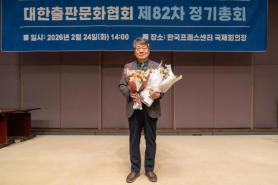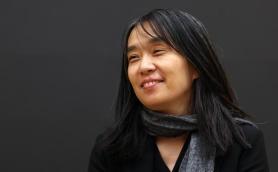
[Yonhap News Photo]
South Korean fiction writer Han Kang won the 2016 Man Booker International Prize for her novel "The Vegetarian," the organizer announced Tuesday.
"The story of a Korean woman who awakens from uneasy dreams to find herself transformed into an enigma without a key. Evocative and suggestive, 'The Vegetarian' startles for the depth of its strangeness," the organizer said.
Judging panel chairman Boyd Tonkin said: "In a style both lyrical and lacerating, it reveals the impact of this great refusal both on the heroine herself and on those around her. This compact, exquisite and disturbing book will linger long in the minds, and maybe the dreams, of its readers."
He also said, "Deborah Smith's perfectly judged translation matches its uncanny blend of beauty and horror at every turn."
South Korean fiction writer Han Kang reads parts of her book "The Vegetarian" in a book event in London on May 15, 2016. (Yonhap)
Critically acclaimed and a New York Times best-seller, the novel depicts a modern-day Korean life where disturbing, recurring nightmares force the heroine, Yeong-hye, to drop her eating habits and become a vegetarian. In a country where meat, most of the time, is the center of meals and conformity overrides individuality, her family and husband, shocked and in disbelief, regard it as an act of subversion. They try to change her mind in a forceful way, and Yeong-hye, in turn, turns more defiant and detached.
"The Vegetarian" is Han's first novel to be translated into English. With a degree in Korean Literature from Yonsei University in Seoul, the 45-year-old Korean novelist teaches creative writing at the Seoul Institute of the Arts.
Smith, the 28-year-old translator, was monolingual until the age of 21. The British national also translated Han's book "Human Acts," published early this year by the London-based Portobello books, which also published "The Vegetarian" in 2015.
"The Vegetarian" was long-listed in March among 155 candidates and became one of six novels short-listed last month.
Han was recently featured extensively in the May issue of "World Literature Today," a bimonthly magazine published by the University of Oklahoma.
In the magazine, she wrote that her novel “depicts a woman who rejects ... omnipresent and precarious violence even at a cost to herself," adding that “eating meat, cooking meat, all these daily activities embody a [version of extreme] violence that has been normalized.”
Kim Seong-kon, president of the Literature Translation Institute of Korea, said the award "will serve as a springboard for Korean literature to leap forward."
The top prize of £50,000 ($70,995) will be equally divided and given to the author and the translator.'
(Yonhap)
Copyright ⓒ Aju Press All rights reserved.




